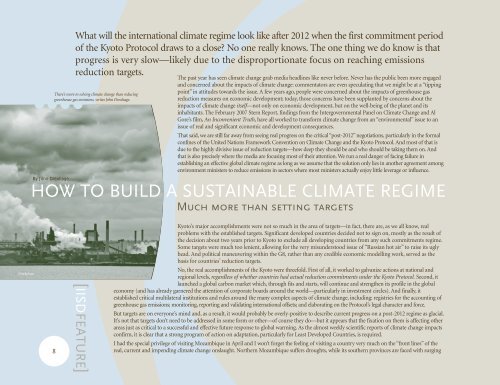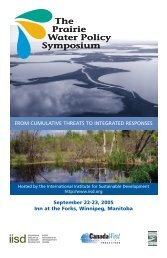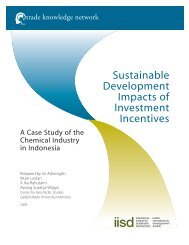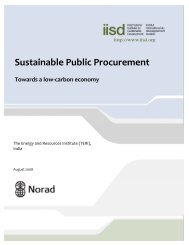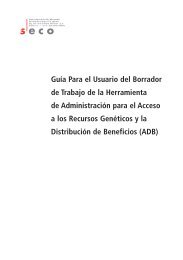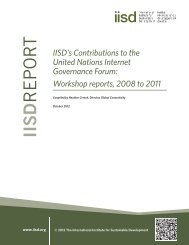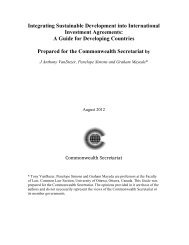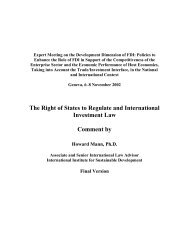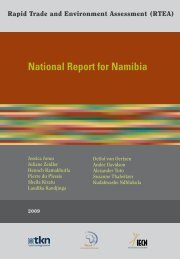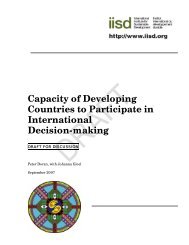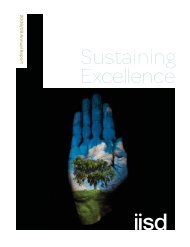2006/2007 Annual Report - International Institute for Sustainable ...
2006/2007 Annual Report - International Institute for Sustainable ...
2006/2007 Annual Report - International Institute for Sustainable ...
You also want an ePaper? Increase the reach of your titles
YUMPU automatically turns print PDFs into web optimized ePapers that Google loves.
What will the international climate regime look like after 2012 when the first commitment period<br />
of the Kyoto Protocol draws to a close? No one really knows. The one thing we do know is that<br />
progress is very slow—likely due to the disproportionate focus on reaching emissions<br />
reduction targets.<br />
The past year has seen climate change grab media headlines like never be<strong>for</strong>e. Never has the public been more engaged<br />
and concerned about the impacts of climate change: commentators are even speculating that we might be at a “tipping<br />
There’s more to solving climate change than reducing<br />
greenhouse gas emissions, writes John Drexhage.<br />
point” in attitudes towards the issue. A few years ago, people were concerned about the impacts of greenhouse gas<br />
reduction measures on economic development; today, those concerns have been supplanted by concerns about the<br />
impacts of climate change itself—not only on economic development, but on the well-being of the planet and its<br />
inhabitants. The February <strong>2007</strong> Stern <strong>Report</strong>, findings from the Intergovernmental Panel on Climate Change and Al<br />
Gore’s film, An Inconvenient Truth, have all worked to trans<strong>for</strong>m climate change from an “environmental” issue to an<br />
issue of real and significant economic and development consequences.<br />
That said, we are still far away from seeing real progress on the critical “post-2012” negotiations, particularly in the <strong>for</strong>mal<br />
confines of the United Nations Framework Convention on Climate Change and the Kyoto Protocol. And most of that is<br />
due to the highly divisive issue of reduction targets—how deep they should be and who should be taking them on. And<br />
that is also precisely where the media are focusing most of their attention. We run a real danger of facing failure in<br />
establishing an effective global climate regime as long as we assume that the solution only lies in another agreement among<br />
environment ministers to reduce emissions in sectors where most ministers actually enjoy little leverage or influence.<br />
By John Drexhage<br />
HOW TO BUILD A SUSTAINABLE CLIMATE REGIME<br />
Much more than setting targets<br />
iStockphoto<br />
8<br />
[IISDFEATURE]<br />
Kyoto’s major accomplishments were not so much in the area of targets—in fact, there are, as we all know, real<br />
problems with the established targets. Significant developed countries decided not to sign on, mostly as the result of<br />
the decision about two years prior to Kyoto to exclude all developing countries from any such commitments regime.<br />
Some targets were much too lenient, allowing <strong>for</strong> the very misunderstood issue of “Russian hot air” to raise its ugly<br />
head. And political maneuvering within the G8, rather than any credible economic modelling work, served as the<br />
basis <strong>for</strong> countries’ reduction targets.<br />
No, the real accomplishments of the Kyoto were threefold. First of all, it worked to galvanize actions at national and<br />
regional levels, regardless of whether countries had actual reduction commitments under the Kyoto Protocol. Second, it<br />
launched a global carbon market which, through fits and starts, will continue and strengthen its profile in the global<br />
economy (and has already garnered the attention of corporate boards around the world—particularly in investment circles). And finally, it<br />
established critical multilateral institutions and rules around the many complex aspects of climate change, including: registries <strong>for</strong> the accounting of<br />
greenhouse gas emissions; monitoring, reporting and validating international offsets; and elaborating on the Protocol’s legal character and <strong>for</strong>ce.<br />
But targets are on everyone’s mind and, as a result, it would probably be overly-positive to describe current progress on a post-2012 regime as glacial.<br />
It’s not that targets don’t need to be addressed in some <strong>for</strong>m or other—of course they do—but it appears that the fixation on them is affecting other<br />
areas just as critical to a successful and effective future response to global warming. As the almost weekly scientific reports of climate change impacts<br />
confirm, it is clear that a strong program of action on adaptation, particularly <strong>for</strong> Least Developed Countries, is required.<br />
I had the special privilege of visiting Mozambique in April and I won’t <strong>for</strong>get the feeling of visiting a country very much on the “front lines” of the<br />
real, current and impending climate change onslaught. Northern Mozambique suffers droughts, while its southern provinces are faced with surging


